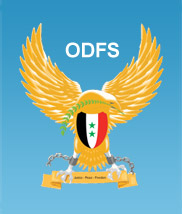ODFS Director Ribal Al-Assad interviewed by German Magazine Spiegel Online: 'Syria is today a Vassal State of Iran'
Sunday, 2 May 2010
http://www.spiegel.de/international/world/0,1518,692295,00.html
29 April 2010
Democracy Activist Ribal Al-Assad
'Syria is today a Vassal State of Tehran'
Ribal Al-Assad, the cousin of Syrian President Bashar Assad, is an advocate of greater democracy in Syria. He talks to SPIEGEL ONLINE about Iran's influence on the country, allegations that Damascus supplied Hezbollah with weapons and the conditions for a peace deal with Israel.
SPIEGEL ONLINE: Syria has been able to improve its relations with the United States and Turkey in recent years. Is the country on the path from pariah status to partner?
Assad: Syria should not see it as a triumph. The US's new approach is a test. Syria needs to now prove itself. Damascus should not in any case imagine that it has received a green light from the international community to oppress people.
SPIEGEL ONLINE: Your cousin is Syrian President Bashar Assad. The two of you are greatly divided over the issue of democracy. Is he at all willing to democratize the country further?
Assad: He has promised to do so. But so far nothing has happened. The problem is the influence of Iran. Syria is today a vassal state of Tehran.
SPIEGEL ONLINE: Should your cousin therefore break off relations with Iran?
Assad: Syria must act independently and should no longer be submissive or act subordinately. This can only succeed, however, if Syria has a government of national unity that can win popular support for the goal of more democracy.
SPIEGEL ONLINE: There were reports that Syria supplied the militant group Hezbollah in Lebanon with Scud missiles. What do you know about this?
Assad: If that is true, it would seriously damage Syria's reputation in the world. So far, however, there have only been rumors about it. Hezbollah is not dependent on Syria, but on Iran. Hezbollah is part of the government in Beirut. They need to stop being a tool of Tehran. Iran is using Hezbollah to stir up trouble in the Middle East.
SPIEGEL ONLINE: What could persuade Hezbollah to give up this alliance?
Assad: The international community should speak with Hezbollah and offer something in return for renouncing Iran, such as money for schools and hospitals, for example.
SPIEGEL ONLINE: Many people in the West believe that Tehran is trying to develop a nuclear bomb. What can still be done to stop Iran?
Assad: Iranian President Mahmoud Ahmadinejad is very close to his goal and is not willing to give up now. The only hope is the "Green Revolution" (editor's note: the Iranian opposition movement). The international community must support the movement very patiently. Sanctions don't achieve anything. They only affect ordinary people.
SPIEGEL ONLINE: Why is there still no peace agreement between Israel and Syria?
Assad: The precondition for that is Israel returning the Golan Heights to Syria. (Editor's note: Israel has occupied the Golan Heights since the 1967 Six Day War.)
SPIEGEL ONLINE: In other words, a compromise currently seems unrealistic.
Assad: The deal is land for peace. That is something that Israel will ultimately have to accept.
Interview conducted by Jan Puhl
More news articles

